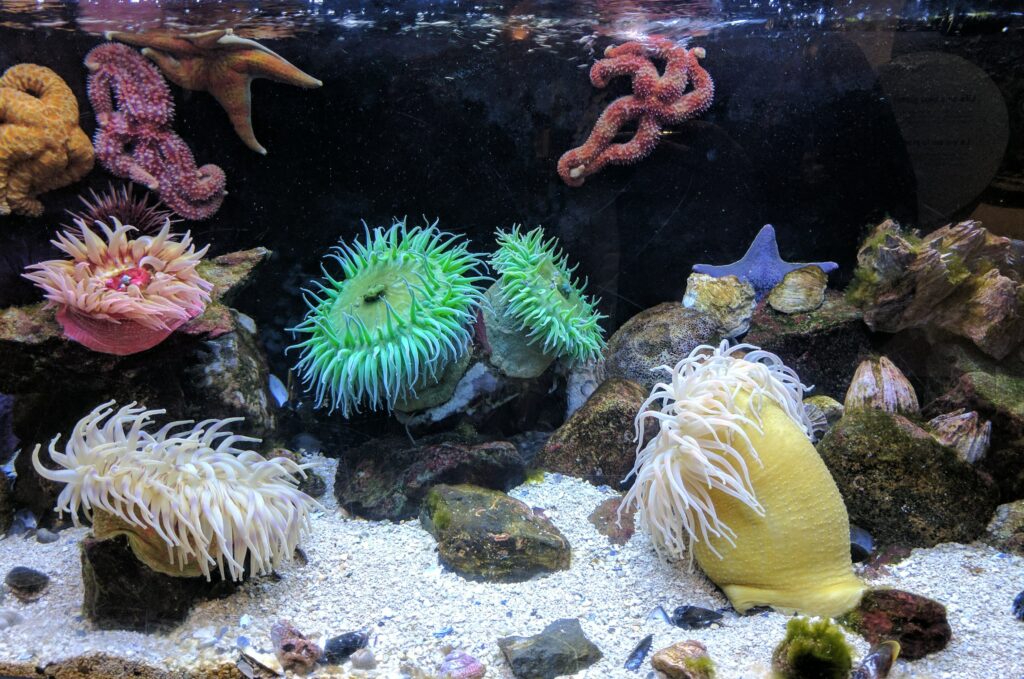Chalice Coral: A Comprehensive Guide for Beginners
Corals are not just beautiful creatures that add color to an underwater world, but they also play a vital role...
Jim Sabellico
March 20, 2022

Maintaining a saltwater aquarium can be a challenging but immensely rewarding experience. One of the most common problems that aquarists face is high levels of nitrates in their tank. This can lead to algae blooms, sick fish, and other problems. In this article, we will discuss three methods that you can use to reduce nitrates in your saltwater aquarium: water changes, protein skimming, and denitrification filters.
Nitrates are a common pollutant in water and can cause serious problems in reef tanks. They are produced when ammonia is broken down by bacteria, and can be introduced to tanks through food, livestock, and decaying organic matter. High levels of nitrates can cause algae blooms, reduced oxygen levels, and fish toxicity.
Reef tanks are especially susceptible to the negative effects of high levels of nitrates, as coral and other marine life can die quickly when exposed to them. Nitrates can cause coral to bleach, stunt their growth, and kill them. They can also affect the health of other marine life in the tank, such as fish and invertebrates. In order to keep your reef tank healthy, it is important to monitor the levels of nitrates and take steps to reduce them if necessary.
There are a few different ways to test for nitrates in your tank. The most common way is to use a nitrate test kit, which can be purchased at most pet stores. To use this type of kit, you will need to collect a sample of water from your tank and add it to the testing solution according to the instructions. After a few minutes, the color of the solution will change and you can compare it to the chart included with the kit to determine the nitrate level in your tank.
Another way to test for nitrates is through the use of an electronic nitrate monitor. These devices are placed in the tank and measure the levels of nitrates present. They usually have a display that shows the current nitrate level as well as the average over time.
Once you have determined the levels of nitrates in your tank, you can take steps to reduce them if necessary. One way to do this is through regular water changes. This will help dilute the nitrates that are already present in the water and will also remove any organic matter that may be contributing to their production. It is important to perform a large water change (50% or more) every few weeks in order to keep the nitrate levels under control.
Another way to reduce nitrates is by using an aquarium filter that is designed to remove them from the water. There are a variety of these filters available on the market, and they can be very effective at reducing nitrate levels.
Finally, live plants can also be used to help reduce nitrate levels in your tank. Plants consume nitrates as part of their normal growth process, so having a few live plants in your tank can help to keep the nitrate levels down.
By taking these steps to test for and reduce the levels of nitrates in your tank, you can help to keep your reef tank healthy and thriving.
Nitrate levels in reef tanks can be a bit of a balancing act – too high and your coral can start to bleach, while too low and your tank can become algae-ridden. Here are a few tips on how to keep nitrate levels as low as possible:
1. Maintain a healthy aquarium – A well-maintained aquarium is less likely to experience problems with nitrate build-up. Regular water changes and vacuuming of the substrate are important in keeping the nitrate levels low.
2. Use live rock and/or sand – Live rock and sand can help to filter out nitrates from the water.
3. Use a protein skimmer – A protein skimmer will help to remove organic matter from the water, which can contribute to nitrate build-up.
4. Use an algae turf scrubber – An algae turf scrubber can help to remove nitrates from the water by using algae to absorb them.
5. Reduce feedings – Feeding your fish and corals only what they can eat in a few minutes will help to reduce the amount of organic waste that is produced and therefore the amount of nitrates.
6. Use a denitrator – A denitrator can help to remove nitrates from the water by using bacteria to break them down.
7. Regularly test your water parameters – Checking your water parameters regularly will help you to identify any potential problems with nitrate levels before they get out of hand.
Reef tanks are very sensitive to high nitrate levels, so it’s important to test your tank water regularly. There are a few different ways to test for nitrates, but the most accurate way is with a reef aquarium test kit.
To use a reef aquarium test kit, simply follow the instructions that come with the kit. Most kits will require you to add a few drops of water to a test tube or vial, then add a chemical reagent. Once the reagent has been added, you’ll need to wait a few minutes for the reaction to occur.
Once the reaction is complete, you’ll be able to compare the color of the water in the test tube or vial to a chart that comes with the kit. This will tell you the level of nitrates in your tank.
No matter what you do, it’s important to keep an eye on your nitrate levels and take action if they get too high. Uncontrolled high nitrate levels can lead to problems like algae growth and fish stress. So test your reef tank water regularly and make sure the levels of nitrates are kept in check!
After checking the nitrate levels in your reef tank, it’s important to check the results of any tests you perform. Here’s what you need to know about interpreting the results of your nitrate test.
The most important thing to remember is that nitrate levels can fluctuate rapidly in a reef tank. For this reason, it’s best to take multiple readings over a period of time to get an accurate picture of what’s going on.
Nitrate levels can be affected by many factors, including the type of filtration you’re using, the amount of algae in your tank, and the number of fish and other animals present. If possible, try to control these variables when taking readings.
When interpreting the results of your nitrate test, it’s helpful to compare them to the levels recommended by experts for reef tanks. The safe range for nitrate levels in the reef tank is 0.2-2 ppm. If your levels are outside of this range, it’s important to take steps to correct the problem.
If your nitrate levels are too high, there are a few things you can do to bring them down. First, make sure you’re making regular water changes and vacuuming the gravel to remove any built-up waste. You may also want to consider adding live plants to your tank, as they can help absorb excess nutrients.
If your nitrate levels are too low, on the other hand, you may need to take steps to increase them. This can be done by adding a nitrate-rich substrate to your tank or by using a commercial supplement designed to raise nitrate levels.
Whatever the results of your nitrate test may be, it’s important to take action if they’re outside of the recommended range. By keeping an eye on your nitrate levels and taking steps to correct any problems, you can help ensure the health and happiness of your reef tank inhabitants.
Nitrates are one of the most important water parameters to test in a reef tank. Too many nitrates can cause problems such as algae growth and coral bleaching. It’s important to test your reef tank’s water for nitrates regularly to ensure that they stay within acceptable levels. How often you should test your reef tank’s water for nitrates depends on a variety of factors, including the size of your tank, the type of livestock you keep, and how well your filtration system is working. As a general rule, it’s a good idea to test your reef tank’s water for nitrates at least once a week. If you have a particularly large tank, or if you’re keeping livestock that is particularly sensitive to high levels of nitrates, you may need to test more often.
As a reef tank keeper, it’s important to be aware of the levels of nitrates in your water. Nitrates can be harmful to both fish and plant life, so it’s important to take steps to keep them under control.
Now that you know how to reduce nitrates in a saltwater aquarium, it’s time to put this knowledge into practice and watch your reef tank thrive! Remember to test your water parameters regularly and make any necessary adjustments to keep your tank healthy. Most importantly, enjoy your beautiful reef display.
Related article: How to Keep Your Reef Tank Clean: Tips For Keeping Your Sand Clean

I am the founder of J. Louis, a digital marketing agency focused on providing innovative solutions and strategies built on a foundation of creative design and technology. A family man who loves travel and reef tanks, I’ve been coined as a jack of all trades, master of a few of them, most specifically website and sales funnel design, monetization and growth strategies, and viral marketing. I began pursuing my passions for business by cutting my neighbor’s lawns when I was just 8 years old and never looked back. Over the past 20 years, I have amassed significant experience providing consulting, design and development services for Fortune 500 companies, government, retail, private individuals, and A-list celebrities.
Corals are not just beautiful creatures that add color to an underwater world, but they also play a vital role...
As we move into the new year, it's time to start thinking about what reef tank LED lighting kits will...

Proceeds from all purchases go directly to Great Barrier Reef Foundation and supporting their mission.
Want to stay connected with all the latest news in the Reef Tank Addict community? Drop your email below!
Proudly Supporting The Great Barrier Reef Foundation
Copyright © 2023. All rights reserved.